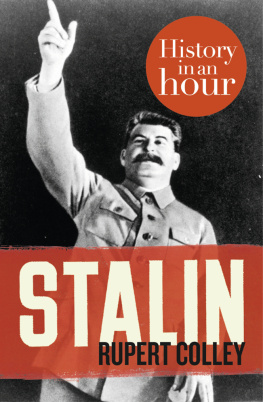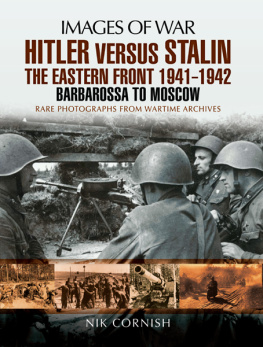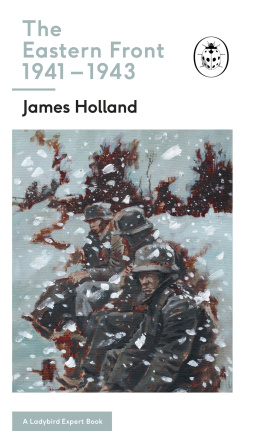First Mariner Books edition 2006
Copyright 2005 by Constantine Pleshakov
ALL RIGHTS RESERVED
For information about permission to reproduce selections from this book, write Permissions, Houghton Mifflin Harcourt Publishing Company, 215 Park Avenue South, New York, NY 10003.
www.hmhco.com
The Library of Congress has cataloged the print edition as follows:
Pleshakov, Konstantin.
Stalins folly : the tragic first ten days of World War II on the Eastern front / Constantine Pleshakov.
p. cm.
Includes bibliographical references and index.
ISBN 0-618-36701-2
1. World War, 19391945CampaignsEastern Front. 2. Stalin, Joseph, 18791953. I. Title.
D764.P5317 2005 940.54'217dc22
2004065133
ISBN -13: 978-0-618-77361-9 (pbk.)
ISBN -10: 0-618-77361-4 (pbk.)
Maps by Jacques Chazaud
e ISBN 978-0-547-41650-2
v2.0515
For Lenya Serebriakov, who joined me in a rip tide on a Long Island beach; without his being there, I probably would have told the June 22 story to horseshoe crabsnot to mention the redemption of my still precariously young twins, Anton and Anya, who watched my plight from the shore, and my mother, Elza, unaware, four thousand miles away from us that day
Acknowledgments
I owe the completion of this project to a number of people and want to express my gratitude to each.
To my familymy mother, Elza Bilenko, and my kids, Anton Pleshakov and Anya Pleshakova. Life in general and writing in particular make sense only when one can share.
To my agent, Susan Rabiner. Without Susan, this book would never have been conceived or, of course, placed.
To Joyce Seltzer, of Harvard University Press, who helped me find Susan.
To Eric Chinski, who enthusiastically welcomed me to Houghton Mifflin.
To the editor of this book, Amanda Cook at Houghton Mifflin, who patiently dealt with Stalins follies and a very tense author who sometimes despaired of interpreting them. To Liz Duvall, who trimmed the book beautifully, and Erica Avery, for all the inquiries.
To Sarah McNally, for her inspiring interest in my writing.
To Edwina Cruise, for laughs and tears.
To Tania Babyonysheva, for insights.
To Sasha Sumerkin, for wisdom and magic.
Special thanks to Bill and Jane Taubman, John Curtis Perry, Marty and Susan Sherwin, and Stephen Jones for their generous and invaluable help in the Kafkaesque Pleshakov Denial Case.
To Joan Cocks, Lev B. Doubnitsky, Leonid Kolpakov, Slava Mogutin, Katia Ozhegova, Katia Yegorova, and Sasha Zotikov, for involvement and support.
To my 2003 Critical Social Thought 350 class at Mount Holyoke CollegeAlima Bucciantini, Megan Chabalowski, Dori Cohen, Noelle Danian, Amelia (Miles) Goff, Naomi Goldberg, Hannah Hafter, Clodagh Kosior, Laura Norton-Cruz, Clare Robbins, and Sarah (Serafina) Youngdahl-Lombardifor stimulation.
List of Maps
The Red Army deployment on June 22, 1941, and the preemptive war plan
The odyssey of Lieutenant General Riabyshevs Eighth Mechanized Corps
The eastern front, July 3, 1941
Prologue
Joseph Stalin was an insomniac, often staying up until dawn. But on the evening of June 21, 1941, the absolute ruler of what had once been the czars immense realm retired uncharacteristically early.
The preceding day had been stressful. Reports of German plans to attack the Soviet Union had been reaching him all day, from many sources. Only a few days before, he hadnt believed such reports. He had not doubted that Hitler would one day turn his rapacious leer on the Soviet Union, but in Stalins mind that would not happen before spring 1942, after Britain was on its knees. The German General Staff, he believed, would not allow Germany to be bogged down once again, as it had been in 1914, in a two-front war. By then Stalins own plan, which he had kept secret thus far even from the majority of his generals, would be in place. It called for a full-scale attack on the Germans, one that would allow the Soviet Union to acquire even more of Eastern Europe and join it to the Red empire.
Until mid-June, Stalin had felt fairly secure, and if anything had made him uneasy, it was not the German lines rapidly unfurling along the Soviet Unions western border but the pestering of his two top military commanders, Peoples Commissar of Defense Semen Timoshenko and the stubborn and outspoken chief of the general staff, Georgy Zhukov. While the timing of a German attack was settled in Stalins mind, the generals were far less sanguine. By his order they had developed the top-secret plan to launch the Red Armys offensive down the road, but they also knew that if Germany attacked now, the plan would be irrelevant, and there was no defensive strategy to fall back on, because the dictator deemed such a precaution unnecessary. It was a potentially catastrophic scenario, as the two generals continually reminded him.
Stalin had withheld from them the alarming information he was receiving from his spies in Europeinformation that consistently predicted an imminent German attackbut they were receiving sufficiently unnerving reports of their own from the frontier. At least ten German planes were crossing the Soviet border daily, some penetrating 30 miles into Soviet territory. One of the planes had not turned around until it reached Moscow, 650 miles inside the border, where it safely and impudently landed, presumably having reconnoitered the most likely route for the German ground troops from the frontier to the Soviet capital. Timoshenko and Zhukov agreed that intrusions like this unambiguously pointed at Hitlers intention to strike soon. On June 13 they started pressing Stalin to allow them to put the troops on the western border on high alert. Lets talk about this later, the dictator said, brushing them off.
But in a few days the generals returned, even more determined, and asked for an aggressive regrouping of troops and even a mobilization of reservists.
Do you understand that this would mean war? Stalin exploded.
The generals kept silent, and in that meaningful silence Stalin toned down his anger and matter-of-factly asked, How many divisions do we have in the west?
One hundred forty-nine.
See, this should be enough. The Germans do not have that many.
But Zhukov had his answer ready. According to our intelligence, a German division has fourteen to sixteen thousand men, and ours just eight thousand.
Stalin became exasperated. You cannot always trust the intelligence, he snapped.
Zhukov and Timoshenko didnt dare to object, but privately they agreed that this remark was preposterous. However, the cruel irony was that Stalin had a point: because they were denied access to most spy cables, the generals didnt know that spies had already warned of German invasion, first as early as July 1940, then in the first weeks of 1941, then again in April. Now, distrustful by nature, the dictator simply dismissed the spies warnings as stupidity or, worse, treason.
Throughout the first weeks of June he had met Zhukovs and Timoshenkos pleas with immense irritation and tried to see as little of the generals as possible. However, he had now lost all peace of mind. Spy cables from Bucharest or Helsinki could be ignored, but the concentration of Wehrmacht troops along the border and the presence of Luftwaffe planes in Soviet airspace were hard facts.
Twenty-two months earlier, in August 1939, Stalin had allied himself with Hitler by signing the Soviet-German nonaggression pact. So far the alliance had paid off. Hitler had allowed Stalin to occupy Estonia, Latvia, Lithuania, and the areas of Poland, Romania, and Finland that had been part of the old czarist empire. Eastern Poland had been particularly useful property to acquire, since it pushed the Soviet border 200 miles west.






